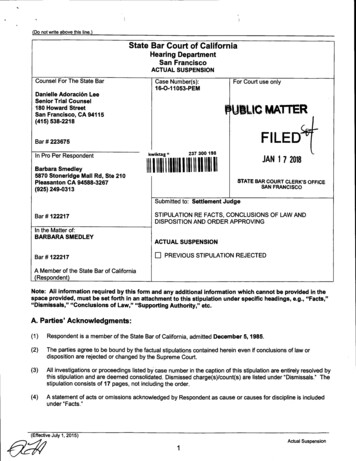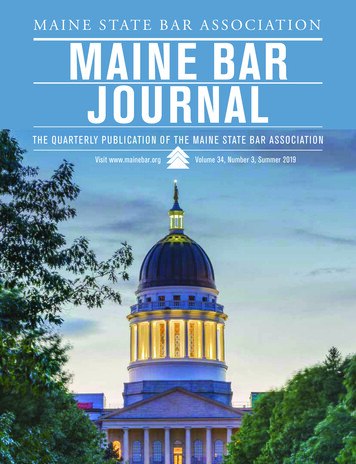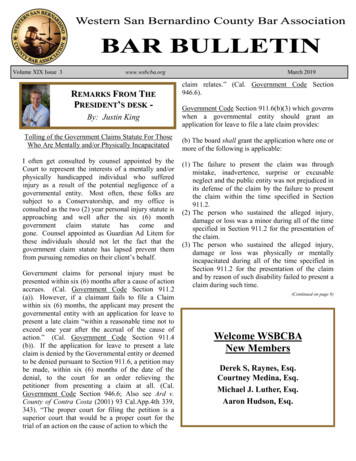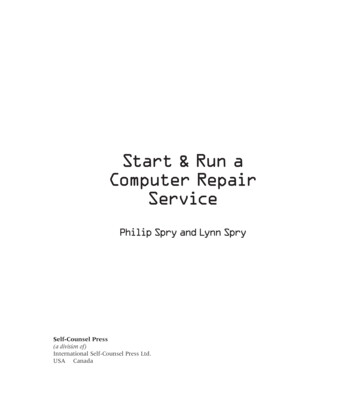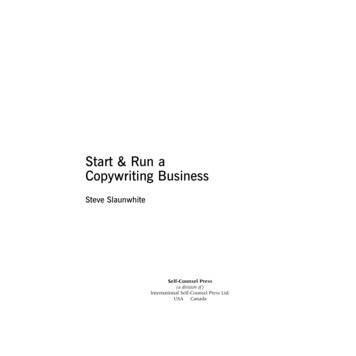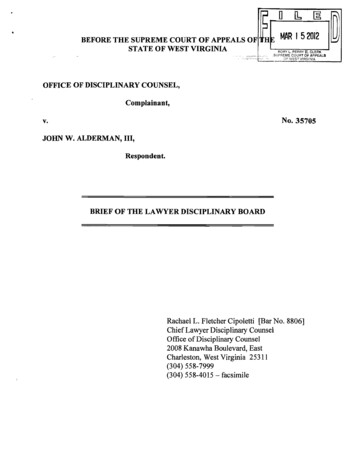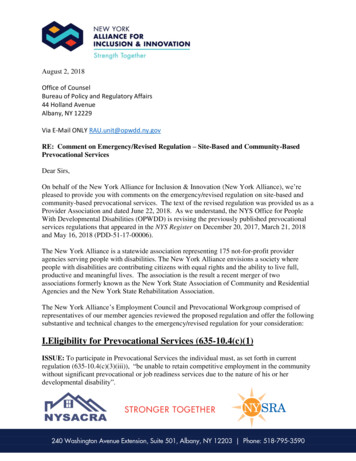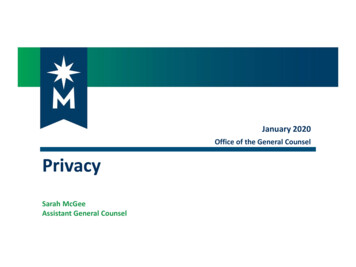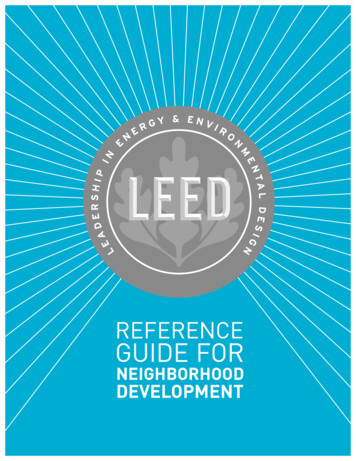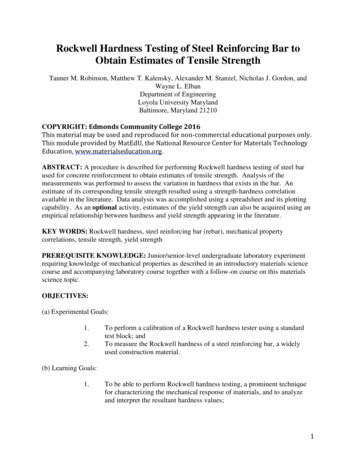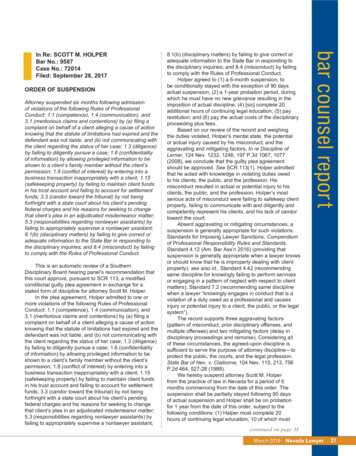
Transcription
ORDER OF SUSPENSIONAttorney suspended six months following admissionof violations of the following Rules of ProfessionalConduct: 1.1 (competence), 1.4 (communication), and3.1 (meritorious claims and contentions) by (a) filing acomplaint on behalf of a client alleging a cause of actionknowing that the statute of limitations had expired and thedefendant was not liable, and (b) not communicating withthe client regarding the status of her case; 1.3 (diligence)by failing to diligently pursue a case; 1.6 (confidentialityof information) by allowing privileged information to beshown to a client’s family member without the client’spermission; 1.8 (conflict of interest) by entering into abusiness transaction inappropriately with a client; 1.15(safekeeping property) by failing to maintain client fundsin his trust account and failing to account for settlementfunds; 3.3 (candor toward the tribunal) by not beingforthright with a state court about his client’s pendingfederal charges and his reasons for seeking to changethat client’s plea in an adjudicated misdemeanor matter;5.3 (responsibilities regarding nonlawyer assistants) byfailing to appropriately supervise a nonlawyer assistant;8.1(b) (disciplinary matters) by failing to give correct oradequate information to the State Bar in responding tothe disciplinary inquiries; and 8.4 (misconduct) by failingto comply with the Rules of Professional Conduct.This is an automatic review of a SouthernDisciplinary Board hearing panel’s recommendation thatthis court approve, pursuant to SCR 113, a modifiedconditional guilty plea agreement in exchange for astated form of discipline for attorney Scott M. Holper.In the plea agreement, Holper admitted to one ormore violations of the following Rules of ProfessionalConduct: 1.1 (competence), 1.4 (communication), and3.1 (meritorious claims and contentions) by (a) filing acomplaint on behalf of a client alleging a cause of actionknowing that the statute of limitations had expired and thedefendant was not liable, and (b) not communicating withthe client regarding the status of her case; 1.3 (diligence)by failing to diligently pursue a case; 1.6 (confidentialityof information) by allowing privileged information to beshown to a client’s family member without the client’spermission; 1.8 (conflict of interest) by entering into abusiness transaction inappropriately with a client; 1.15(safekeeping property) by failing to maintain client fundsin his trust account and failing to account for settlementfunds; 3.3 (candor toward the tribunal) by not beingforthright with a state court about his client’s pendingfederal charges and his reasons for seeking to changethat client’s plea in an adjudicated misdemeanor matter;5.3 (responsibilities regarding nonlawyer assistants) byfailing to appropriately supervise a nonlawyer assistant;8.1(b) (disciplinary matters) by failing to give correct oradequate information to the State Bar in responding tothe disciplinary inquiries; and 8.4 (misconduct) by failingto comply with the Rules of Professional Conduct.Holper agreed to (1) a 6-month suspension, tobe conditionally stayed with the exception of 90 daysactual suspension; (2) a 1-year probation period, duringwhich he must have no new grievance resulting in theimposition of actual discipline; (4) [sic] complete 20additional hours of continuing legal education; (5) payrestitution; and (6) pay the actual costs of the disciplinaryproceeding plus fees.Based on our review of the record and weighingthe duties violated, Holper’s mental state, the potentialor actual injury caused by his misconduct, and theaggravating and mitigating factors, In re Discipline ofLerner, 124 Nev. 1232, 1246, 197 P.3d 1067, 1077(2008), we conclude that the guilty plea agreementshould be approved. See SCR 113(1). Holper admittedthat he acted with knowledge in violating duties owedto his clients, the public, and the profession. Hismisconduct resulted in actual or potential injury to hisclients, the public, and the profession. Holper’s mostserious acts of misconduct were failing to safekeep clientproperty, failing to communicate with and diligently andcompetently represent his clients, and his lack of candortoward the court.Absent aggravating or mitigating circumstances, asuspension is generally appropriate for such violations.Standards for Imposing Lawyer Sanctions, Compendiumof Professional Responsibility Rules and Standards,Standard 4.12 (Am. Bar Ass’n 2016) (providing thatsuspension is generally appropriate when a lawyer knowsor should know that he is improperly dealing with clientproperty); see also id., Standard 4.42 (recommendingsame discipline for knowingly failing to perform servicesor engaging in a pattern of neglect with respect to clientmatters), Standard 7.2 (recommending same disciplinewhen a lawyer “knowingly engages in conduct that is aviolation of a duty owed as a professional and causesinjury or potential injury to a client, the public, or the legalsystem”).The record supports three aggravating factors(pattern of misconduct, prior disciplinary offenses, andmultiple offenses) and two mitigating factors (delay indisciplinary proceedings and remorse). Considering allof these circumstances, the agreed-upon discipline issufficient to serve the purpose of attorney discipline—toprotect the public, the courts, and the legal profession.State Bar of Nev. v. Claiborne, 104 Nev. 115, 213, 756P.2d 464, 527-28 (1988).We hereby suspend attorney Scott M. Holperfrom the practice of law in Nevada for a period of 6months commencing from the date of this order. Thesuspension shall be partially stayed following 90 daysof actual suspension and Holper shall be on probationfor 1 year from the date of this order, subject to thefollowing conditions: (1) Halper must complete 20hours of continuing legal education, 10 of which mustbar counsel repor tIn Re: SCOTT M. HOLPERBar No.: 9587Case No.: 72014Filed: September 28, 2017continued on page 38March 2018 Nevada Lawyer37
March 2018continued from page 37be related to ethics and 10 of which must be related to lawoffice management or client relations, in addition to the hoursrequired by SCR 210 within 1 year from the date of this order;(2) Holper must have no grievance resulting in discipline of aletter of reprimand or greater during his probation period; (3)Holper must pay 2,185.57 in restitution ( 426.50 to the clientin count 4 of the complaint and 1,759.07 to the client in count5 within 90 days from the date of this order; and (4) Holpermust pay the actual costs of the disciplinary hearing plus 2,500 in fees within 30 days from the date of this order orreceipt of the State Bar’s bill of costs, whichever is later. SeeSCR 120. The parties shall comply with SCR 115 and SCR121.1. It is so ORDERED.DOUGLAS, J., dissenting:I would not approve the conditional guilty plea. Therefore,I dissent.In Re: JULIUS M. ENGELBar No.: 8057Case No.: 73119Filed: October 24, 2017ORDER IMPOSING RECIPROCAL DISCIPLINEAttorney suspended for three years, with all but the first yearof that term stayed, following suspension by the CaliforniaSupreme Court.This is a petition for reciprocal discipline of attorney JuliusM. Engel pursuant to SCR 114. Engel accepted money froma client and then failed to perform any legal work, ceasedcommunication with the client, and failed to provide anaccounting or return the client’s money. Engel also provideduntruthful responses to the California State Bar during itsinvestigation of Engel regarding these issues. In consideringthis misconduct, the State Bar Court of California’s HearingDepartment concluded that there were seven aggravatingcircumstances (prior disciplinary record, multiple violations,refusal or inability to provide an accounting of trust funds,significant harm to the client, lack of remorse, failure tomake restitution, and a high level of victim vulnerability) andno mitigating circumstances. On February 15, 2017, theCalifornia Supreme Court denied Engel’s petition for reviewand suspended him for three years, with all but the firstyear stayed, and placed him on probation subject to certainconditions. Engel self-reported his California suspension tothe State Bar of Nevada.SCR 114(4) provides that this court shall impose identicalreciprocal discipline unless the attorney demonstrates, or thecourt finds, that one of four exceptions applies. We concludethat none of the four exceptions weighs against the impositionof identical reciprocal discipline in this case. While Californiafound Engel to have violated a California rule that has noNevada counterpart, see SCR 114(4)(d) (indicating that ifthe misconduct established in the other jurisdiction does notconstitute misconduct under Nevada’s ethical rules, identicaldiscipline may not be appropriate), the five remaining, andarguably more egregious ethical violations, constitute ethicalviolations in Nevada (Engel failed to report an adverse38 Nevada LawyerMarch 2018judgment entered against him in a professional malpracticecase in violation of Cal. Bus. & Prof. Code §6068(o)(2) (West2017). Furthermore, the discipline imposed in California iscommensurate with discipline Nevada imposes for the mostserious of those remaining five violations. See Standards forImposing Lawyer Sanctions, Compendium of ProfessionalResponsibility Rules and Standards 452 (Am. Bar Ass’n 2016)(“The ultimate sanction imposed should at least be consistentwith the sanction for the most serious instance of misconductamong a number of violations.”). Thus, we grant the petition forreciprocal discipline.Accordingly, attorney Julius M. Engel is hereby suspendedfrom the practice of law in Nevada for three years, with all butthe first year of that term stayed, as of February 15, 2017.Additionally, during the three years Engel shall be placed onprobation subject to the following conditions: (1) he provideproof that he paid the 2,000 in restitution required by theCalifornia order; (2) he comply with all Rules of ProfessionalConduct during his probation; (3) he submit quarterly reportsto the State Bar concerning whether he has complied with allRules of Professional Conduct during the previous quarter;(4) he complete a minimum of six CLE classes in the areas ofethics and law practice management, in addition to annuallymandated CLE credits; and (5) he provide proof that he passedthe Multistate Professional Responsibility Examination withinone year of the California suspension order. Engel shall complywith SCR 116 upon petitioning for reinstatement from theone-year actual suspension. Upon reinstatement, Engel shallserve out any remaining portion of the three-year probationaryperiod. Engel and the State Bar shall comply with SCR 115and SCR 121.1. It is so ORDERED.In Re: SUSAN WASKOBar No.: 3840Case No.: 73162Filed: October 24, 2017ORDER IMPOSING SUSPENSION WITH CONDITIONSTHAT COULD RESULT IN STAY OF SUSPENSIONAttorney suspended for three months, with potential forstay, based on violations of RPC 8.1(b) (bar admissionand disciplinary proceedings) and SCR 79 (disclosures bymembers of the bar).This is an automatic review of a Northern NevadaDisciplinary Board hearing panel’s recommendation that thiscourt suspend attorney Susan Wasko for six months andone day based on violations of RPC 8.1(b) (bar admissionand disciplinary proceedings) and SCR 79 (disclosures bymembers of the bar). Because no briefs have been filed, thismatter stands submitted for decision based on the record. SCR105(3)(b).The facts and charges alleged in the complaint aredeemed admitted because Wasko failed to answer thecomplaint and a default was entered (The State Bar sentthe bar complaint, the notice of intent to take a default, theorder appointing the chair, and the request for entry of defaultto Wasko through regular and certified mail at her SCR 79
In Re: CURTIS W. CANNONBar No.: 10535Case No.: 73723Filed: September 19, 2017ORDER IMPOSING TEMPORARYSUSPENSION UNDER SCR 111Attorney temporarily suspended following a felonyconviction.The State Bar has filed a petition under SCR 111to inform this court that attorney Curtis Cannon hasbeen convicted of voluntary sexual conduct betweena prisoner and another person, a category D felony inviolation of NRS 212.187. Cannon did not self-reportthe conviction to the State Bar as required by SCR111(2). (Cannon was required to report the matter tothe State Bar within 30 days after his “conviction,” whichpursuant to SCR 111(1) includes entry of a guilty plea,regardless of whether the final judgment of convictionhas been entered. SCR 111(2).)Because the conviction is for a felony offense,it is a “serious” crime as defined in SCR 111(6). Assuch, SCR 111(7) and (8) normally would requirethat we temporarily suspend Cannon and refer himto a disciplinary board for a hearing to determine theextent of the discipline to be imposed, if any. Cannon,however, was transferred to disability inactive statusunder SCR 117 in 2014 and, therefore, currentlyis prohibited from practicing law. (In addition to thetransfer to disability inactive status, Cannon has beenadministratively suspended from the practice of lawin Nevada pursuant to SCR 212 since December2012 based on his failure to complete continuing legaleducation requirements. In re Application of Bd. OfContinuing Legal Educ., Docket No. 61517 (OrderDismissing Petition as to Certain Respondent Attorneysand Granting Petition as to Certain RespondentAttorneys, December 28, 2012).In re Disability of Cannon, Docket No. 62540(Orders of Transfer to Disability Inactive Status,September 24, 2014 and February 6, 2015). Where,as here, “an attorney convicted of a crime is at thattime prohibited from practicing due to a . transfer todisability inactive status under Rule 117,” this court hasauthority to “enter an appropriate order directing howthe conviction shall be addressed.” SCR 111(11).We conclude that a referral to a disciplinary boardis unnecessary because the conduct underlying theconviction appears to have been the subject of agrievance that was filed against Cannon before he wastransferred to disability inactive status. The disciplinaryproceedings as to that grievance, and several othersfiled against Cannon, were stayed pursuant to SCR117. The conviction therefore may be addressed inthe context of the pending disciplinary proceedingsshould they be resumed upon Cannon’s reinstatementto active status, as provided in SCR.117(4). A hearingpanel also may consider whether the conviction isbar counsel repor taddress and an alternate address. Wasko was alsopersonally served a copy of the default, a notice of thedefault hearing, and the State Bar’s summary of evidenceand designation of witnesses). The admitted factsestablish that Wasko violated the above referenced rulesby failing to keep a current address with the State Bar andby failing to respond to the State Bar’s lawful requests forinformation.Turning to the appropriate discipline, we review thehearing panel’s recommendation de novo. SCR 105(3)(b).Although we “must . exercise independent judgment,” thepanel’s recommendation is persuasive. In re Discipline ofSchaefer, 117 Nev. 496, 515, 25 P.3d 191, 204 (2001).In determining the appropriate discipline, we weigh fourfactors: “the duty violated, the lawyer’s mental state,the potential or actual injury caused by the lawyer’smisconduct, and the existence of aggravating or mitigatingfactors.” In re Discipline of Lerner, 124 Nev. 1232, 1246,197 P.3d 1067, 1077 (2008).Wasko knowingly or intentionally violated dutiesowed to the profession, which harmed the integrityof the profession as it depends on a self-regulatingdisciplinary system. Absent aggravating and mitigatingcircumstances, suspension is the baseline sanctionfor the most serious misconduct in this matter—theviolation of RPC 8.1(b). Standards for Imposing LawyerSanctions, Compendium of Professional ResponsibilityRules and Standards, Standard 7.2 (Am. Bar Ass’n 2015)(suspension is baseline sanction for knowingly failing tocooperate with a disciplinary investigation); see also id.at 452 (“The ultimate sanction imposed should at leastbe consistent with the sanction for the most seriousinstance of misconduct among a number of violations.”).The record supports the panel’s finding of no mitigatingcircumstances and four aggravating circumstances(pattern of misconduct, prior disciplinary offense,substantial experience in the practice of law, and multipleoffenses).Considering all of these circumstances, we agreewith the hearing panel that Wasko’s misconduct warrantsa suspension. We conclude, however, that a three-monthsuspension is sufficient to serve the purpose of attorneydiscipline—to protect the public, the courts, and the legalprofession, not to punish the attorney. State Bar of Nev.v. Claiborne, 104 Nev. 115, 213, 756 P.2d 464, 527-28(1988).We hereby suspend attorney Susan Wasko fromthe practice of law in Nevada for a period of threemonths. The suspension shall be stayed on the followingconditions: within 90 days from the date of this order,Wasko must (1) provide proof that she has satisfiedthe CLE and cost award requirements set forth in, orassociated with, the public reprimand issued on January25, 2013, and (2) pay the costs of the current disciplinaryproceedings, including 2,500 under SCR 120. Theparties shall comply with SCR 121.1. It is so ORDERED.continued on page 40March 2018 Nevada Lawyer39
March 2018continued from page 39relevant to any petition for reinstatement to active status thatCannon files under SCR 117(4). (A hearing panel may alsoconsider whether the conviction is relevant to any petition forreinstatement to active status that Cannon files under SCR117(4).)But, given the nature of the criminal conviction andits connection to Cannon’s practice of the law, we areconvinced that a temporary suspension under SCR 111 iswarranted to ensure that Cannon cannot resume the activepractice of the law until a disciplinary panel and this courthave the opportunity to consider the appropriate discipline,if any, as a result of his criminal conviction. Accordingly, wetemporarily suspend attorney Curtis W. Cannon pursuantto SCR 111 from the date of this order. The State Bar shallcomply with SCR 121.1. It is so ORDERED. This is our finaldisposition of this matter.In Re: DAVID A. RAHMBar No.: 5908Case No.: 73240Filed: November 14, 2017ORDER APPROVING CONDITIONALGUILTY PLEA AGREEMENTAttorney suspended two years following admissions ofviolations of RPC 1.3 (diligence), RPC 1.4 (communication),RPC 1.5 (fees), RPC 1.15 (safekeeping property), RPC5.3 (responsibilities regarding nonlawyer assistants), RPC5.4 (professional independence of a lawyer), RPC 5.5(unauthorized practice of law), RPC 7.2 (advertising), RPC7.2A (advertising requirements), 7.3 (communications withprospective clients), and RPC 8.4 (misconduct).This is an automatic review of a Southern NevadaDisciplinary Board hearing panel’s recommendation that thiscourt approve, pursuant to SCR 113, a conditional guiltyplea agreement in exchange for a stated form of disciplinefor attorney David A. Rahm. Under this agreement, Rahmadmitted to multiple violations of RPC 1.3 (diligence),RPC 1.4 (communication), RPC 1.5 (fees), RPC 1.15(safekeeping property), RPC 5.3 (responsibilities regardingnonlawyer assistants), RPC 5.4 (professional independenceof a lawyer), RPC 5.5 (unauthorized practice of law), RPC7.2 (advertising), RPC 7.2A (advertising requirements),7.3 (communications with prospective clients), and RPC8.4 (misconduct). The agreement provides for a two-yearsuspension, the payment of 179,238.42 in restitution toformer clients, and payment of 2,500 in fees plus the actualcosts of the disciplinary proceeding.Rahm admitted to the facts and violations alleged in theconsolidated complaints. The record therefore establishesthat Rahm associated with a loan modification companyand failed to adequately supervise non-attorney employees,failed to have advertisements approved by the State Bar,40 Nevada LawyerMarch 2018a
sufficient to serve the purpose of attorney discipline—to protect the public, the courts, and the legal profession. State Bar of Nev. v. Claiborne, 104 Nev. 115, 213, 756 P.2d 464, 527-28 (1988). We hereby suspend attorney Scott M. Holper from the practice of law in Nevada for a perio

